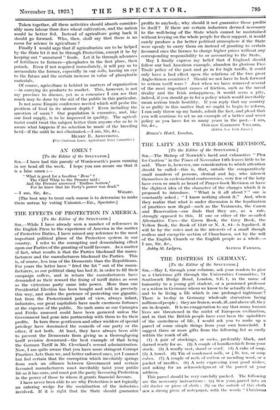THE EFFECTS OF PROTECTION IN AMERICA.
[To the Editor of the SPECTATOR.] SIR,—While I have already seen a number of references in the English Press to the experience of America in the matter of Protective Duties, I have missed any reference to the most important political phase of the Protective system in our country. I refer to the corrupting and demoralizing effect upon our Parties of the granting of tariff favours. As a matter of fact, what results is that the Parties blackmail the manu- facturers and the manufacturers blackmail the Parties. This is, of course, less true of the Democrats than the Republicans. For years the latter have " fried the fat " out of the manu- facturers, as our political slang has had it, in order to fill their campaign coffers, and in return the manufacturers have demanded as their reward the fixing of tariff duties as soon as the victorious party came into power. More than one Presidential Election has been bought and sold in precisely this way, and under the pretence of protecting our gigantic, but from the Protectionist point of view, always infant, industries, our great capitalists have made enormous fortunes at the expense of the public. No such sums as our Carnegies and Fricks amassed could have been garnered unless the Government had gone into partnership with them to fix their profits. In turn these gentlemen and other wielders of special privilege have dominated the councils of one party or the other, if not both. At least, they have always been able to prevent the Democrats from giving us a thoroughgoing tariff revision downward—the best example of that being the Gorman Tariff in Mr. Cleveland's second administration. Now, I am quite aware that you have more stringent Corrupt Practices Acts than we, and better enforced ones, yet I cannot but feel certain that the corruption which inevitably springs from such an alliance between Government and certain favoured manufacturers must inevitably taint your public life as it has ours, and must put the party favouring Protection in the power of those to whom it grants financial favours.
I have never been able to see why Protection is not logically an entering wedge for the socialization of the industries involved. If it is right that the State should guarantee profits to anybody, why should it not guarantee those profits to itself ? If there are certain industries deemed necessary to the well-being of the State which cannot be maintained without levying on the whole people for their support, it would surely produce a far better political atmosphere if the State were openly to carry them on instead of granting to certain favoured ones the licence to charge higher prices without any corresponding responsibility to or accounting to the State.
May I finally express my belief that if England should follow our bad American example, abandon its glorious Free Trade policy of the past and go in for high tariffs, it could only have a bad effect upon the relations of the two great Anglo-Saxon countries ? Should we not have to look forward to serious tariff wars ? Just when we have removed several of the most important causes of friction, such as the naval rivalry and the Irish unhappiness, it would seem a pity, indeed, if you should go in for a policy which would inevitably mean serious trade hostility. If you reply that my country is so guilty in this matter that we ought to begin to reform, I can only throw up my hands, admit the fact, and plead that you will continue to set us an example of a better and wiser policy as you have for so many years in the past.—I am,
(Editor New York Nalioo.)
Brown's Hotel, London.


















































 Previous page
Previous page